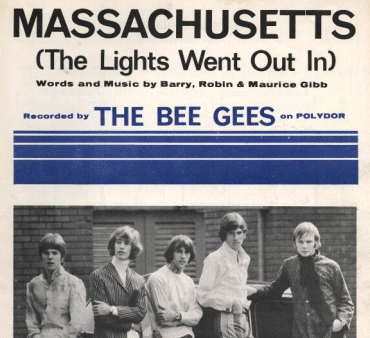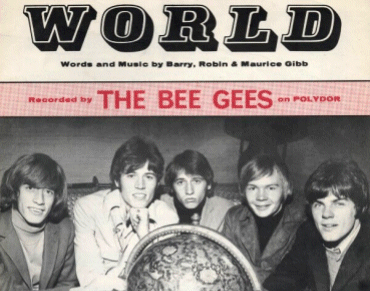Sixties
City presents
a wide-ranging series of
articles on all aspects of the Sixties, penned by the creator of the iconic
60s music paper Mersey
Beat
|
Sixties
City presents
a wide-ranging series of
articles on all aspects of the Sixties, penned by the creator of the iconic
60s music paper Mersey
Beat
|
|||||
|
| For
various reasons the Bee Gees are all flat hunting – and because Barry Gibb
had to leave his last flat because he’d been besieged by fans who’d discovered
his address, I met him in Robert Stigwood’s remarkable new London pad. It’s
a part of Africa in some ways, completely dominated by stuffed wild animals.
Like Terry the Pill and several others, I managed to trip over the stuffed
tiger’s head in the middle of the living room! Suitably settled down, I was interested to find there was a particular reason for naming their No.1 hit ‘Massachusetts.’ I wondered why British songwriters always used the names of American cities – the Flowerpot Men’s ‘San Francisco’ is another recent example – and Barry pointed out that the American cities seemed to have more romantic names than the British ones. But the reason in this particular instance was: “Our first big American hit broke out in Massachusetts, Boston – and this is by way of a tribute. In fact, we were told that if a record sells in Boston it spreads out all over America and becomes a big hit. Massachusetts, it seems, is a fairly accurate guide to the Top 100 chart entries in the States. If they sell there, then they usually break into the big time. We’re going over to America for a big tour soon – and I hope that we’ll be appearing in Massachusetts” Barry said, “but if we aren’t booked there, I’m going to visit there on my first day off”. The Bee Gees are currently being lauded as the group of songwriters second only to The Beatles. Whatever people’s opinions, there is no doubt that they are remarkably prolific. “On average, we write about six songs a week – and we put them down, not as demo’s, but as possible singles. Every song we write these days is an attempt at a single, and we cut them all in the recording studios – in fact, every track on our album has been an attempt at a single. Of course, there are quite a few songs we throw away because we just don’t feel they’re good enough. In the last 11 years we’ve written hundreds, thousands of songs. I’ve been writing since I was nine”. He swept his hand around the room. “There are dozens of our numbers around here that’ll never be used, although they could be good for somebody”. During the past year, Barry has been something of a globetrotter and has visited Athens, Rome, Singapore, India, Columbo, Naples, Suez and Aden. “In Aden I saw all the fighting. Did you know that the terrorists grab Arab families and instruct the little children to throw grenades at British soldiers? If the children don’t do it, they threaten to kill their whole family. The terrorists don’t seem to do any of the fighting themselves. When I was in Rome I visited the Colosseum. I wrote a number about it on the last album, called ’Christian Lionhearted Man Will Show You’ – which would be suitable for one of those Roman Empire films. I liked visiting Rome because I am very interested in history – it was the only thing I was good at in school. I left school at 13. I didn’t even know what Division means. I’ve had no education and I’m the first to admit it”. Barry’s songs are all connected with personal experiences or observations. “All our songs are based on stories. I don’t think any are based on nothing…on the other hand, I don’t like message songs”. Naturally, a number of his songs concern love – and several of them include references to his first love affair. “The first time I ever had a crush on someone was in Brisbane when I was about 14 or 15. She was a beautiful girl called Carol. I was doing some TV shows at the time and she asked me for my autograph. Then I went out with her for about a year – but she shunned me. Her parents even wanted me to quit show business”. All experiences of any depth have a profound effect on Barry, who believes that good entertainers are mainly people who have suffered. “I’ve had my fair share of suffering. When I was two years old I upset a pan of hot water all over me and got scalded." "At one stage they believed I had ten minutes to live – and I spent two years in hospital because of it. I’ve also been hit by a car twice and have been taken to hospital twice with broken thighs. I believe in fact that suffering gives that added incentive to people to fight on. That is to me the answer why Negroes with their Soul Music are so good. They are unhappy people, shunned by white people. Tom Jones, who is one of the greatest voices in the world, must have had something bad happen to him at one time…and John Lennon’s mother was hit by a car and killed. The great painters all had some terrible life – people like Van Gogh, and they’ve seen lesser artists on the way up while they have been unrecognised until after they’d died. Once you’ve suffered you keep the memory of it – even though you may later become successful, ‘cause you can still understand what’s happened to you”. Interested in the effects of suffering, Barry returned to the position of the Negroes in America: “In Harlem you can see groups of kids singing in beautiful harmony – and they are aware of the poverty of their parents, and heartaches. Negroes don’t forget these things. I think there will be a gigantic outbreak by Negroes in the next eight years. No one seems to realise how many Negroes there are in the world. The next step is for Negroes to declare war on the white people. I believe in what they’re doing – striving for equal rights – but don’t believe in the killing. I don’t believe in any violence”. He quoted Mr. Bliss, who told him: “Man is the only animal who kills its own kind with intent”. Mr Charles Bliss is an Australian who has made quite an impression on Barry. “He is a genius. His wife died – and he’d dedicated his whole life to her. So he concentrates all his time on the world language that he has made. But no one will listen to him. So, although he’s poor, he spends all his money on having books printed about this language – and gives them to people.” The Bee Gees have been in formation 11 years – and for most of that time (until last February) they were a trio. “We had eight years of suffering because no one believed in our talent. People laughed at us, jeered at us and told us to stop wasting our time…because we were so young. We had never had basic management or promotion during this period, although our father was a great help to us. He pushed us for the last eight years – and they all laughed at him, too. It’s terrible when you believe in yourself and your close friends believe in your talent, but everybody else laughs at you.” Those eight years of hardship helped mould the Bee Gees, “Because it gave us something to fight for – you’ve got to have a cause to fight for. You live for a reason and you’ve got to fight for it. That is why, I think, multi-millionaires must be the most miserable people alive." "A certain amount of money is fine, you can be happy – but too much money brings unhappiness”. In the future the Bee Gees have an ambition to make good movies – and in the near future they’ll be looking forward to the reaction to their new single ‘World.’ “The world is full of trouble every day – and we wrote the song because we were seeking a meaning behind life. Why was I born? Why am I living? That’s the whole story of the new single! We produce our own discs – and we do most of our recordings in I.B.C. Studios. We don’t write songs outside the studios – ‘Massachusetts’ and ‘World’ were both written after we’d gone into the studio, and we usually go into a studio with nothing but an idea. Then we just sit down and think, and work something out – the technicians understand and give us time to write”. |
  |
|
Article
Text
UK
web hosting by
|